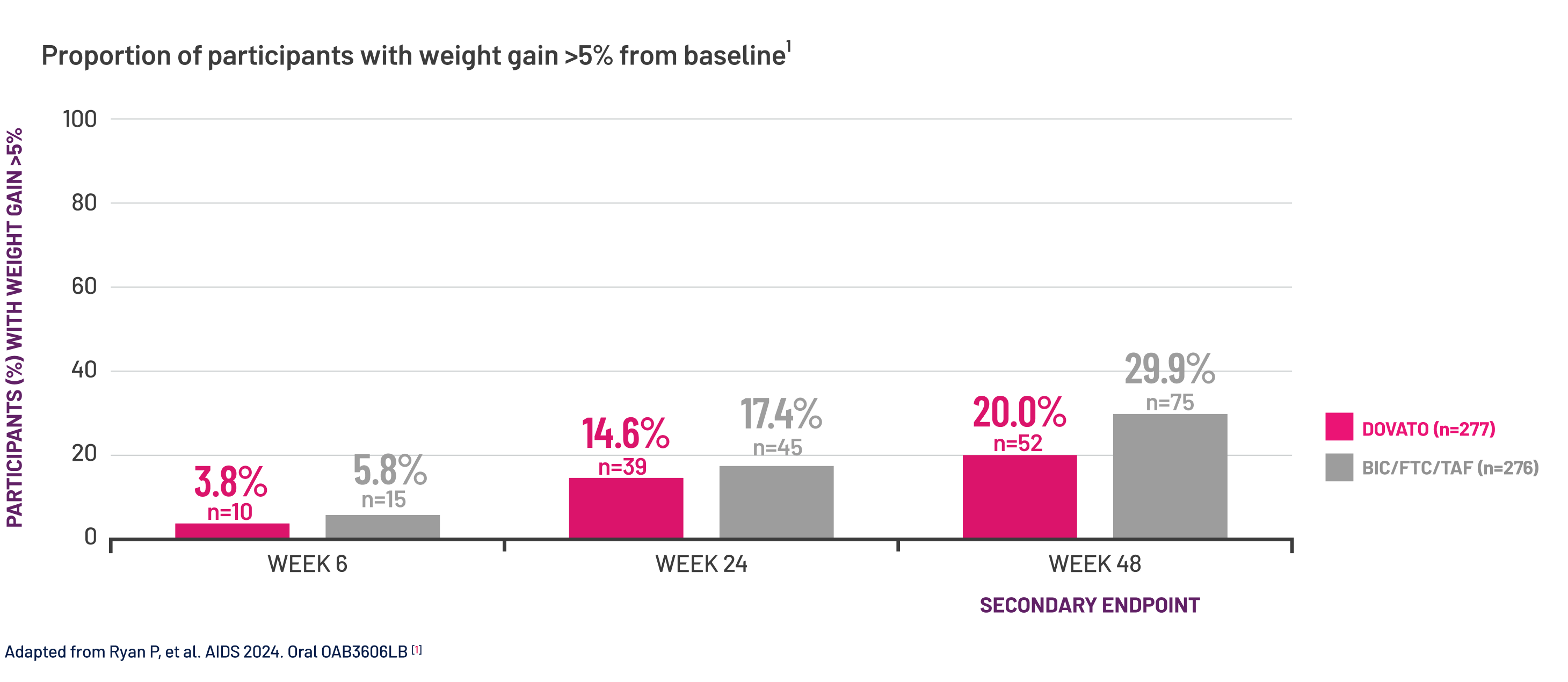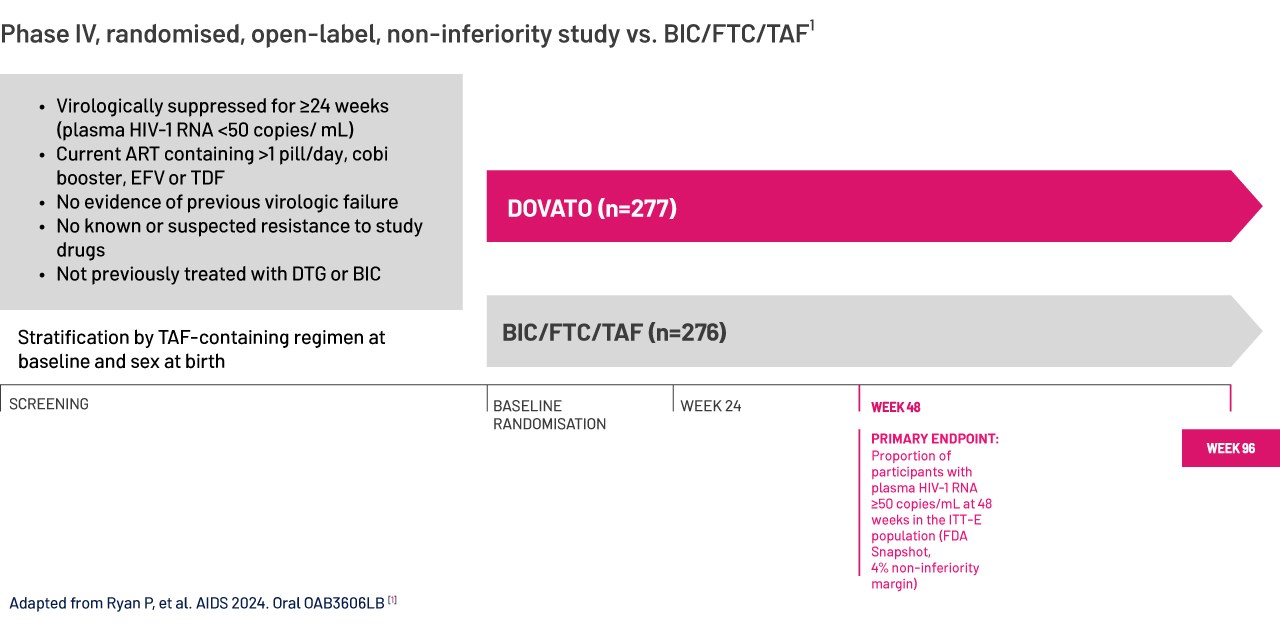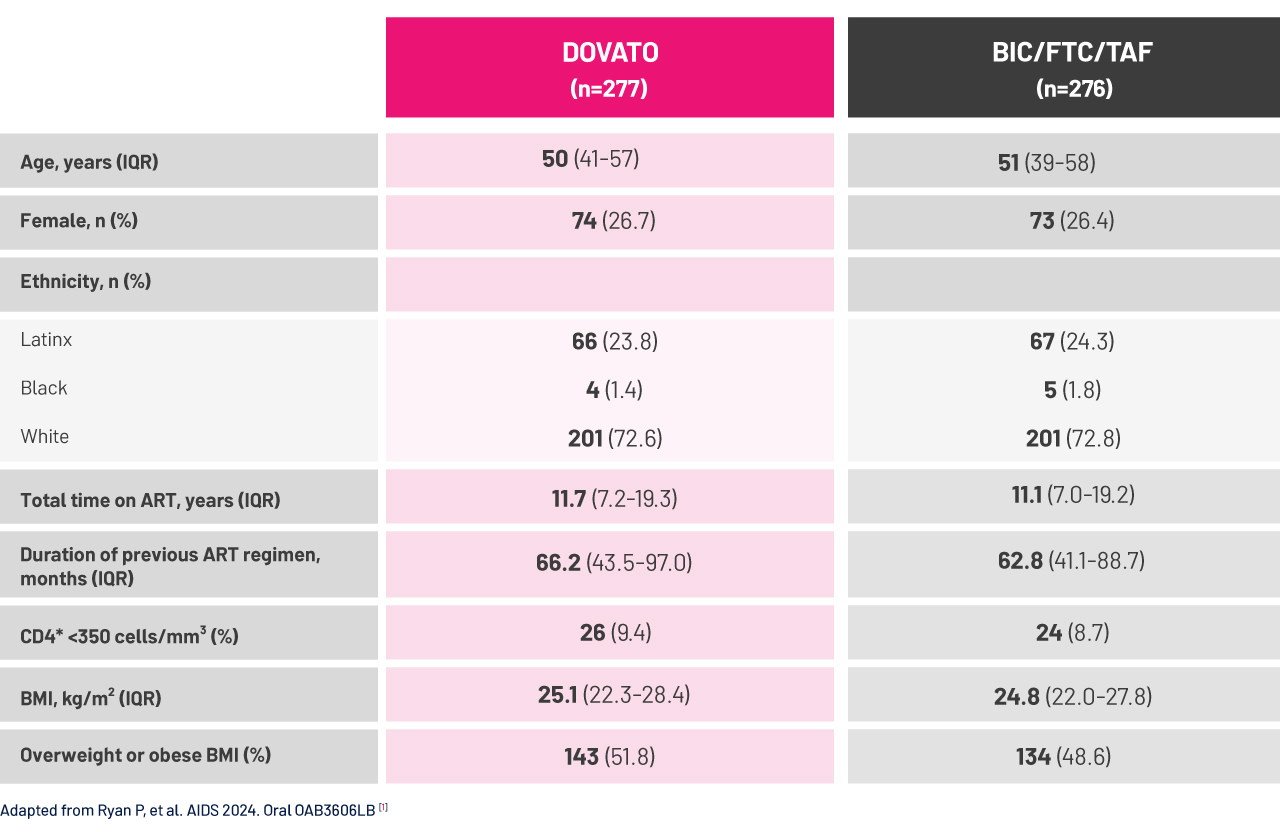DOVATO is indicated for the treatment of human immunodeficiency virus type 1 (HIV-1) infection in adults and adolescents above 12 years of age weighing at least 40kg, with no known or suspected resistance to the integrase inhibitor class, or lamivudine
INTRODUCING PASO DOBLE: THE LARGEST HEAD-TO-HEAD RCT OF DOVATO VS BIC/FTC/TAF[1]
Paso Doble is a phase IV, randomised, open-label, multi-centre study comparing DOVATO (n=277) vs. BIC/FTC/TAF (n=276) as maintenance therapy in virologically suppressed people living with HIV without previous experience of DTG or BIC: 48-week results.[1]
PROVEN EFFICACY AND A HIGH BARRIER TO RESISTANCE VS. BIC/FTC/TAF, WITH FEWER MEDICINES[1]
DOVATO achieved non-inferior efficacy vs. BIC/FTC/TAF and, with 0 cases of treatment-emergent resistance across both arms at 48 Weeks.[1]
Snapshot outcomes in the intention-to-treat-exposed (ITT-E) population.
SWITCHING TO BIC/FTC/TAF LED TO STATISTICALLY SIGNIFICANT GREATER WEIGHT GAIN VS DOVATO[1]
Statistically significant difference in weight gain on BIC/FTC/TAF at 48 weeks: 0.92 KG (95% CI 0.17, 1.66; p=0.016)
Switching to BIC/FTC/TAF was associated with an 81% increased odds of clinically relevant weight gain vs. switching to DOVATO (>5% increase from baseline to Week 48) AOR 1.81 (95% CI 1.19, 2.76) p=0.006.[1]
SUPPORT YOUR PATIENT’S FUTURE NOW, WITH DOVATO
People living with HIV on effective treatment are living longer than ever before.[2] That is why it is important to recognise and consider the challenges that may impact them now and in their years ahead.
Newly diagnosed
Coming to terms with his diagnosis, but is worried about the future
Treatment-experienced (virally suppressed on BIC/FTC/TAF)
Newly optimistic and considering her future goals.
Treatment-experienced (virally suppressed on Tivicay[12] + Truvada)
Recently turned 50 and managing other conditions.
3DR, 3-drug regimen; ABC, abacavir; ART, antiretroviral therapy; AOR, adjusted odds ratio; BIC, bictegravir; COBI, cobicistat; DDI, drug-drug interaction; EVG, elvitegravir; FTC, emtricitabine; NRTI, nucleoside/nucleotide reverse transcriptase inhibitor; RCT, randomised controlled trial; TAF, tenofovir alafenamide; TDF, tenofovir disoproxil fumarate.
†Primary endpoint: the proportion of participants with plasma HIV-1 RNA ≥50 c/mL with DOVATO vs BIC/FTC/TAF at Week 48 (FDA Snapshot; non-inferiority margin 4%)
*Confirmed virologic failure was defined as HIV-1 RNA ≥50 c/mL followed by a second consecutive HIV-1 RNA assessment ≥200 c/mL[1]
References:
- Ryan P, et al. AIDS 2024. Oral OAB3606LB
- The Antiretroviral Therapy Cohort Collaboration; Lancet 2017; 4(8): e349-e356
- Cahn P et al. AIDS 2022; 36(1): 39–48.
- Osiyemi O et al. Clin Infect Dis 2022; 75(6): 975–986
- DOVATO (dolutegravir/lamivudine) Summary of Product Characteristics (SmPC)
- De Wit S et. J Acquir Immune Defic Syndr 2024. 96(2): 156—160.
- Rolle C et al. Open Forum Infect Dis 2023; 10(3): 1–9.
- Llibre J et al. Clin Infect Dis 2023; 76(4): 720–729.
- ViiV Healthcare. Data on File. REF-237004. 2024.
- Maggiolo F et al. BMC Infect Dis 2022; 22(1): 782.
- Ciccullo A et al. J Acquir Immune Defic Syndr 2021; 88(3): 234–237.
- ̌Taramasso L et al. AIDS Patient Care STDS 2021; 35(9): 342–353.
PM-GB-DLL-WCNT-240013 Preparation date: October 2024
Adverse events should be reported. Reporting forms and information can be found at https://yellowcard.mhra.gov.uk/ or search for MHRA Yellowcard in the Google Play or Apple App store. Adverse events should also be reported to GSK via the GSK Reporting Tool or on 0800 221441.
If you are from outside the UK, you can report adverse events to GSK/ViiV by selecting your region and market, here.



![Proven efficacy and a high barrier to resistance vs. BIC/FTC/TAF, with fewer medicines[1]](/content/dam/cf-viiv/viivexchange/en_GB/dovato-2024/dovato-2024-home/dovato-2024-graph1.png)
![Proven efficacy and a high barrier to resistance vs. BIC/FTC/TAF, with fewer medicines[1]](/content/dam/cf-viiv/viivexchange/en_GB/dovato-2024/dovato-2024-home/as.png)








